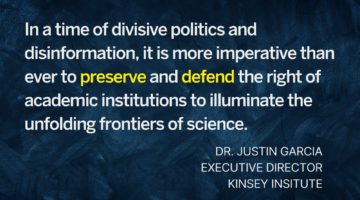I Fantasize About Getting Shrunken Down and Eaten by Another Man: What Does It Mean?
January 31, 2020 by Justin Lehmiller
A reader recently wrote to ask me a question about their biggest sexual fantasy. He said:
“I have always had a sexual fantasy about getting shrunken down and eaten by a man. When I was younger, I was bullied and traumatized by boys my age and my older cousins. I also experienced a sexual assault from a boy my age when I was 11. Around puberty, I started getting really sexually turned on by this fantasy and would masturbate to the thought of the male bullies and sports jocks in school shrinking/eating me…Each time in the fantasy, the man humiliates me and makes feel weak/inferior. It brings me back to the bad feelings I had in childhood. Also, by eating me, I get this sense of being left behind which was a common theme in my childhood.
However, once I got to know one of the bullies and we became friends, the fantasy involving them would go away. I feel like it is because I finally would get male acceptance from them which is what I was yearning for.
All of my romantic/emotional attractions are towards women. However, the fantasy involving men is the primary fantasy I have. Furthermore, I am completely turned off by the idea of having sex with a man. I am very aroused and turned on by straight porn and focus on the women when watching. I have no interests in having sexual or romantic relations with men.
My name question is, does having that fantasy make me gay or bi?”
Thanks for sharing your fantasy. Let’s start by unpacking it a bit before we get to what it might mean for your sexuality.
This fantasy sounds like it falls in the general category of vorarephilia, which is a sexual interest that involves themes of being consumed by other persons or creatures. There isn’t much research out there on this topic, save for a study I blogged about here, but some of the key insights from this research line up with your experiences. For one thing, it’s common for vorarephilia fantasies to begin around the time of puberty (the median age at which people reported their first such fantasy is 12). For another, many of these fantasies (like yours) have pretty big elements of BDSM to them, especially dominance-submission and sodomasochism.
It’s interesting that you connect the development of this fantasy to childhood trauma—specifically, bullying and sexual assault. Trauma can indeed play a role in shaping the content of our sexual fantasies, as I discuss in my book Tell Me What You Want. One of the things I found in studying linkages between people’s early sexual experiences and their adult sexual fantasies is that there is a small but statistically significant correlation between having been sexually victimized at a young age and having more BDSM-themed fantasies. As I explain in the book, this may be one way that people learn to cope with a previous trauma and take psychological control over it.
Before I go on, let me be clear about something: this is not to say that everyone who is into BDSM has a history of trauma or that experiencing trauma always draws people to BDSM. Again, we’re talking about small associations here—and that’s because our fantasies and sexual interests are extremely complex. Two people can develop the same fantasy for very different reasons, and two people can have similar life experiences but go on to develop very different fantasies. As I discuss in Tell Me What You Want, our fantasies are a complicated product of our own lived experiences, our unique personalities, our culture, and our evolutionary history.
Now, regarding the same-sex aspect of this fantasy, it is important to recognize that having a same-sex fantasy does not necessarily make someone gay or bisexual. In fact, it’s not uncommon for people who identify as exclusively heterosexual to report same-sex fantasies. This is another point I address in my book: I found that 59% of women and 26% of men who identified as exclusively heterosexual reported having sexually fantasized about someone of the same sex before. In other words, homoeroticism fantasies are quite common—and they don’t necessarily say something about someone’s sexual orientation or identity.
One other point I would like to emphasize is that fantasies aren’t always sexual desires. Whereas a sexual fantasy is a mental picture that turns you on, a sexual desire is something that you actually want to do. Sometimes our fantasies reflect desires, other times they don’t. So remember that sometimes a fantasy is just a fantasy and, as a result, it’s not self-defining.
Lastly, should you find yourself bothered by your fantasy or if you are having trouble coping with previous sexual trauma, I would encourage you to speak with a therapist or counselor in your local area. For a handy therapist locator tool, see here.
For previous editions of Sex Question Friday, click here. To send in a question for a future edition, click here.
Want to learn more about Sex and Psychology? Click here for previous articles or follow the blog on Facebook (facebook.com/psychologyofsex), Twitter (@JustinLehmiller), or Reddit (reddit.com/r/psychologyofsex) to receive updates. You can also follow Dr. Lehmiller on YouTube and Instagram.
Image Source: 123RF/Andrey Alyukhin
You Might Also Like:
- Why Do Men Have More Unusual Sexual Interests Than Women?
- Rats With Jacket Fetishes? What Animal Sex Studies Reveal About The Origin Of Unusual Sexual Interests
- Sex Question Friday: Why Do Some People Have Fetishes?

Dr. Justin Lehmiller
Founder & Owner of Sex and PsychologyDr. Justin Lehmiller is a social psychologist and Research Fellow at The Kinsey Institute. He runs the Sex and Psychology blog and podcast and is author of the popular book Tell Me What You Want. Dr. Lehmiller is an award-winning educator, and a prolific researcher who has published more than 50 academic works.
Read full bio >


